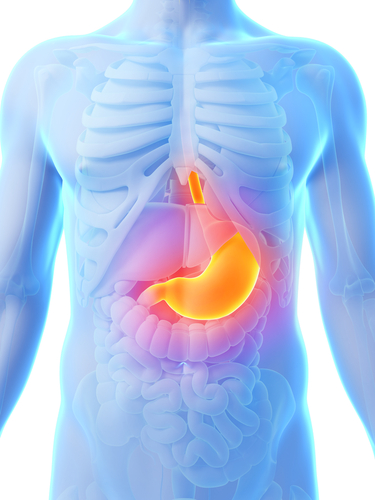 A lack of stomach acid production is one of the main reasons why so many people find weight-loss to be such an arduous task. When someone lacks stomach acid, they're likely to suffer from a sub-optimal metabolism, struggle with blood sugar regulation issues, experience cravings, energy lows and sleep problems, and encounter a variety of other issues. All of these responses make it extremely difficult for someone with a lack of stomach acid to make the lifestyle shifts necessary to lose weight. Furthermore, while poor stomach acid production is a very common problem, it's often overlooked by many healthcare practitioners. Addressing low levels of stomach acid can make a world of difference when it comes to facilitating weight-loss and cultivating a powerful and healthy body.
A lack of stomach acid production is one of the main reasons why so many people find weight-loss to be such an arduous task. When someone lacks stomach acid, they're likely to suffer from a sub-optimal metabolism, struggle with blood sugar regulation issues, experience cravings, energy lows and sleep problems, and encounter a variety of other issues. All of these responses make it extremely difficult for someone with a lack of stomach acid to make the lifestyle shifts necessary to lose weight. Furthermore, while poor stomach acid production is a very common problem, it's often overlooked by many healthcare practitioners. Addressing low levels of stomach acid can make a world of difference when it comes to facilitating weight-loss and cultivating a powerful and healthy body.
1 - What is stomach acid?
The stomach produces stomach acid to help break down and absorb the food we consume. Stomach acid activates important enzymes required for the digestive process and ensures optimal absorption of any nutrients, including proteins, vitamins, minerals and antioxidants. By helping everything get broken down properly, stomach acid also helps fight against the proliferation of bacteria in the stomach and gut – keeping us further balanced. An appropriate level of stomach acid is critical to a properly-functioning physiology and absolutely essential to regulating our body weight and promoting fat-loss.
2 - Symptoms potentially indicative of low stomach acid levels
- Indigestion
- Gas
- Bloating
- Stomach aches and pains
- Pulmonary/esophageal/nasal/sinus mucous formation
- Vertical lines on the nails
- Manifestation of multiple allergies and intolerances
All of these symptoms are good indicators that the body lacks stomach acid. Although many of these symptoms may be considered "normal" because they're experienced so often by so many people, their prevalence should by no means suggest they're normal. These responses are messages from your body telling you something is wrong. Specifically, all of these symptoms are a sign of global inflammation. Inflammation equals breakdown. To restore order to the body, we have to stop this process by examining and treating the digestive system.
3 - Why do we need stomach acid, and how does a lack of it limit us? You are what you absorb!
Without proper stomach acid levels, nutrient absorption is hindered. Although some say we are what we eat, we are really only what we manage to break down and absorb. When our daily nutritional regimen lacks key nutrients, vitamins and minerals, these deficiencies begin to impact bodily functions, further perpetuating the physiological cycle of stress. Our digestive system further down-regulates, leading to a vicious cycle of less and less nutrient absorption and, in turn, greater and greater deficiencies. If we are looking to optimize our health, restore order to our body and lose weight, we must make it our top priority to regulate our stomach acid production.
4 - What causes low stomach acid levels?
It's not surprising that most people tested end up scoring very low on their stomach acid evaluation. Psychological, emotional and environmental stressors (i.e.: poor food quality, harmful substances, lack of sleep, etc.) put our body into a state of chronic stress. The body essentially enters a "fight-or-flight" mode, in which we become sympathetic nervous system dominant. While this innate response to stress may be useful in a situation where we have to run from a lion, as a daily response, it contributes to the breakdown of our bodies. In a "fight-or-flight" state, the body does not prioritize digestion. Instead, it promotes the inhibition of stomach and intestinal operations, slowing down or halting the digestive process. Such a state also triggers fewer bowel movements, meaning toxins remain in the body for longer, which in turn results in the over activation of the immune system. All of these negative physiological consequences ultimately lead to continuous global inflammation in the body. This keeps the body in a chronic state of breakdown. The digestive symptoms outlined earlier are just the beginning of this dramatic downward spiral.
5 - Stomach acid and weight-loss
To optimize our metabolism, we must ensure that our body is secreting normal levels of digestive juices. Why? Stomach acid facilitates the breakdown and absorption of key nutrients essential to the elimination and detoxification of stored fat tissue. Any deficiencies will down-regulate the overall functioning of our bodies, decreasing our metabolic rate, triggering cravings and causing energy issues and problems with blood sugar regulation. All of these negative consequences impair weight-loss efforts. Luckily, stomach acid levels can be tested and assessed. By diagnosing low stomach acid, the healing process can be initiated to rebalance your body and restore physiological and biochemical order.
6 - How to fix low stomach acid levels
Fixing stomach acid levels is a multifaceted process. While stress is the primary and most important cause of poor stomach acid production, the existence of stress is itself a result of numerous lifestyle factors.
Stress is anything that burdens the body at a cellular level. For example, stress can include:
- Psychological and emotional stress, brought on by your relationships, career, pursuit of success, etc.
- Environmental stress (water, air etc.)
- Poor quality food and beverages
- Strenuous physical activities
To start the healing process, we have to reduce the stressors inflicting harm on us. Some practical ways to do this include:
- Eating a healthy and well-balanced diet
- Consuming lots of water to hydrate and detoxify the body
- Rotating our food sources for a variety of nutrients, vitamins, minerals and antioxidants
- Relaxing our bodies before bed by turning off electronics (computers, televisions, cellphone) 30-60 minutes before sleeping and engaging in a relaxation routine (hot bath, reading, meditation, etc.)
- Finding time for ourselves in general to relax and unwind
- Taking action to deal with the stressors of our lives head-on (changing careers and following our passions, addressing stressful relationships, etc.)
- Implementing supplement protocols to reduce inflammation in the body and promote the healing and functioning of the digestive system (for example, good quality, absorbable probiotics, glutamine supplementation, etc.)
* Always consult with a qualified healthcare practitioner before engaging in any type of supplement protocol
Conclusion
The body is made up of many interconnected systems. We cannot look at any one symptom in isolation -- we have to look at the body as a whole. Just like the abdominal region is the physical core of the body, bridging the upper and lower body, the digestive system is the core of our physiology. It's the bridge between the food we consume and the nutrients we absorb for daily functioning. Any deficiency in this physiological core will result in deficiencies in the rest of our bodies. By addressing digestive problems, you'll sleep better, have more energy, experience less cravings, improve focus, boost your metabolic rate and expedite weight-loss. Stomach acid is truly the weakest link in the chain of health for many people. If you’ve never had your stomach acid levels tested, booking an evaluation could be the first step towards restoring balance to your body and getting those weight-loss results you’ve always wanted. For more information, please contact us.
